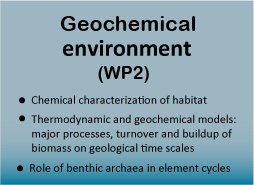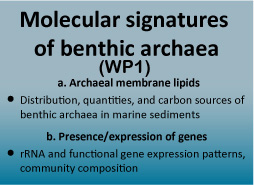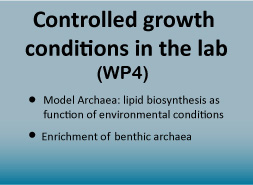Die Inhalte dieser Seite sind leider nicht auf Deutsch verfügbar.
Seitenpfad:
- Organische Geochemie
- ERC-DARCLIFE
- WP1: Molecular signatures
DARCLIFE - Work package 1: Molecular signatures of benthic archaea
Abstract
Work package 1 “Molecular signatures of benthic archaea” has a central role in DARCLIFE and primarily seeks to extract the information from distributions of archaeal lipids and genes in marine sediments.
The two-pronged work package is designed to decode molecular signatures of benthic archaea based on intact membrane lipids (WP1a) and specific marker genes (WP1b). While the organic geochemical analysis of WP1a are conducted in the Hinrichs Lab at the MARUM/Universität Bremen, the molecular biological investigations of WP2a are carried out in the Teske Lab at the University of North Carolina (UNC) in Chapel Hill, NC, USA.
In WP1a "Archaeal membrane lipids" we are studying microbial lipid constituents and their isotopic composition in a global set of marine sediments and in archaeal isolates that are grown under controlled conditions. Moreover, we are using radiocarbon dating techniques on archaeal intact polar lipids (IPLs) and core lipids to constrain the turnover times of archaeal communities, to further evaluate the validity of IPLs as life markers, and to trace carbon sources utilized by benthic archaea. (For more information on IPLS and our analytical techniques see also Biomarkers and Techniques.)
In WP1b "Presence/expression of genes" we are aiming to link archaeal lipid signatures of natural archaeal communities and enrichments to phylogenetically and functionally informative marker genes that identify specific Archaea and their metabolic pathways. We are using metagenome and V6-tag sequencing of uncultured benthic archaea by 454 pyrosequencing technology in order to derive specific information on central carbon metabolism, and specific energy-yielding and biosynthetic pathways.
We will also collect information on Bacteria, which may be equally important players in processes in the deep biosphere as Archaea. DARCLIFE, however, is motivated by the predominance and uniqueness of archaeal populations and we will therefore use the molecular information on Bacteria largely as contextual variables.
The two-pronged work package is designed to decode molecular signatures of benthic archaea based on intact membrane lipids (WP1a) and specific marker genes (WP1b). While the organic geochemical analysis of WP1a are conducted in the Hinrichs Lab at the MARUM/Universität Bremen, the molecular biological investigations of WP2a are carried out in the Teske Lab at the University of North Carolina (UNC) in Chapel Hill, NC, USA.
In WP1a "Archaeal membrane lipids" we are studying microbial lipid constituents and their isotopic composition in a global set of marine sediments and in archaeal isolates that are grown under controlled conditions. Moreover, we are using radiocarbon dating techniques on archaeal intact polar lipids (IPLs) and core lipids to constrain the turnover times of archaeal communities, to further evaluate the validity of IPLs as life markers, and to trace carbon sources utilized by benthic archaea. (For more information on IPLS and our analytical techniques see also Biomarkers and Techniques.)
In WP1b "Presence/expression of genes" we are aiming to link archaeal lipid signatures of natural archaeal communities and enrichments to phylogenetically and functionally informative marker genes that identify specific Archaea and their metabolic pathways. We are using metagenome and V6-tag sequencing of uncultured benthic archaea by 454 pyrosequencing technology in order to derive specific information on central carbon metabolism, and specific energy-yielding and biosynthetic pathways.
We will also collect information on Bacteria, which may be equally important players in processes in the deep biosphere as Archaea. DARCLIFE, however, is motivated by the predominance and uniqueness of archaeal populations and we will therefore use the molecular information on Bacteria largely as contextual variables.








